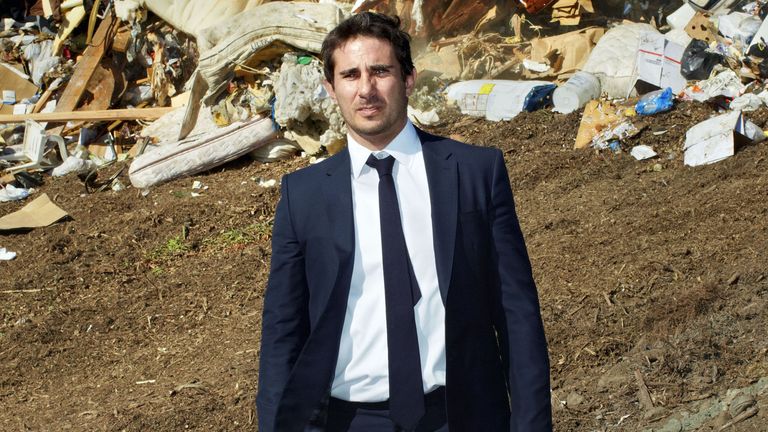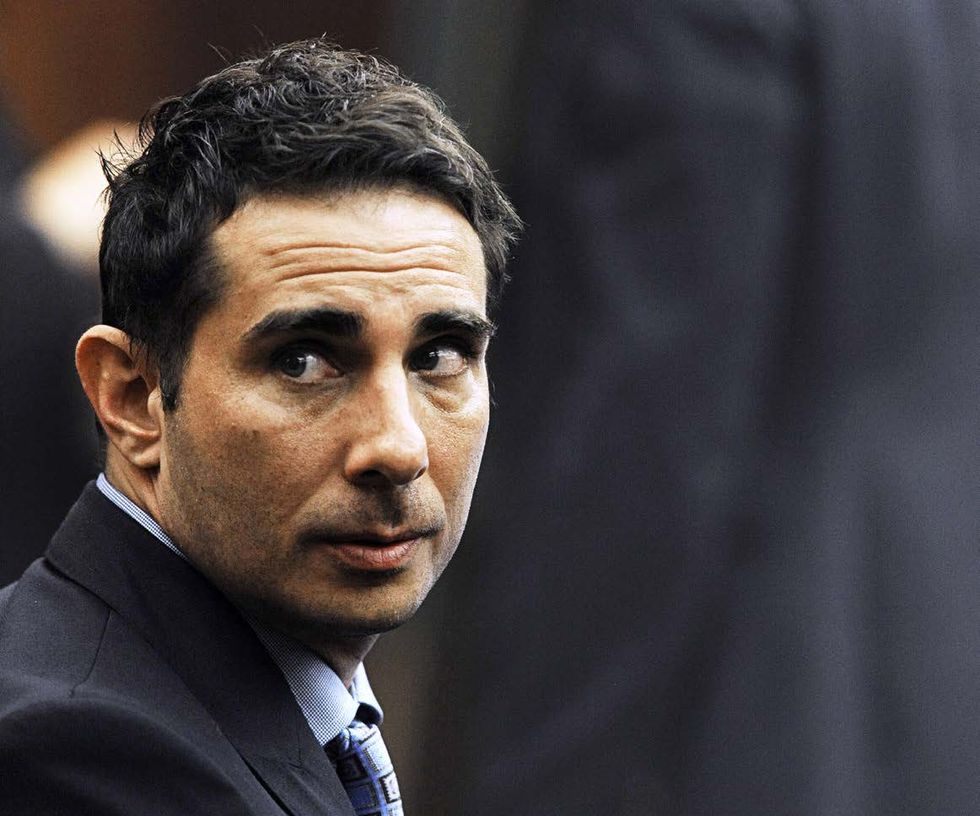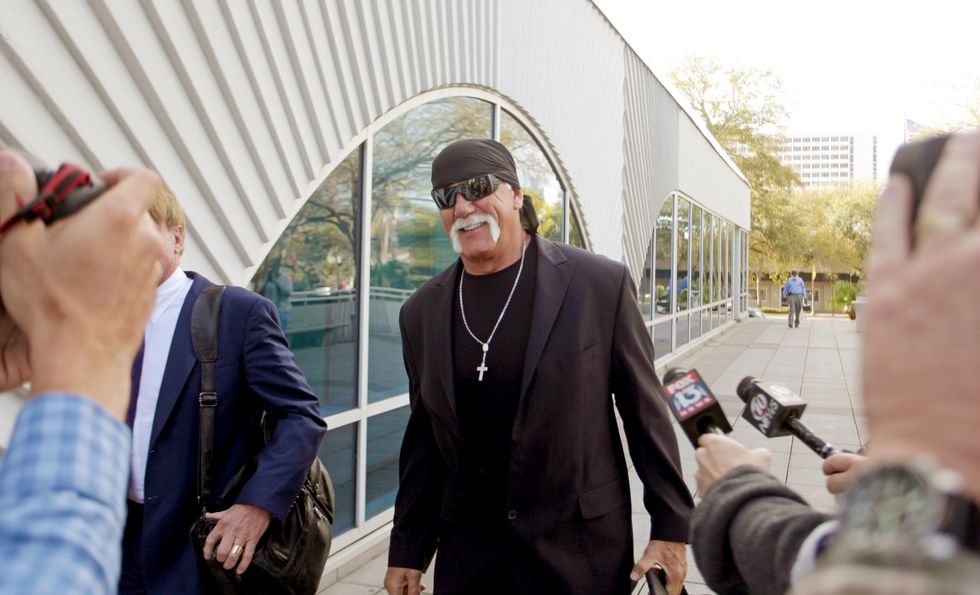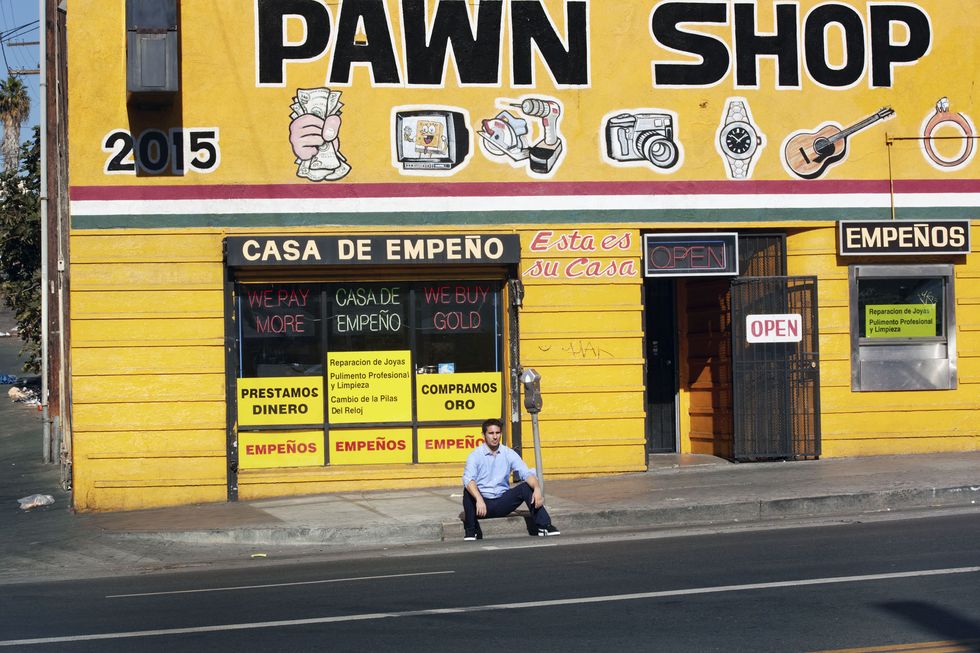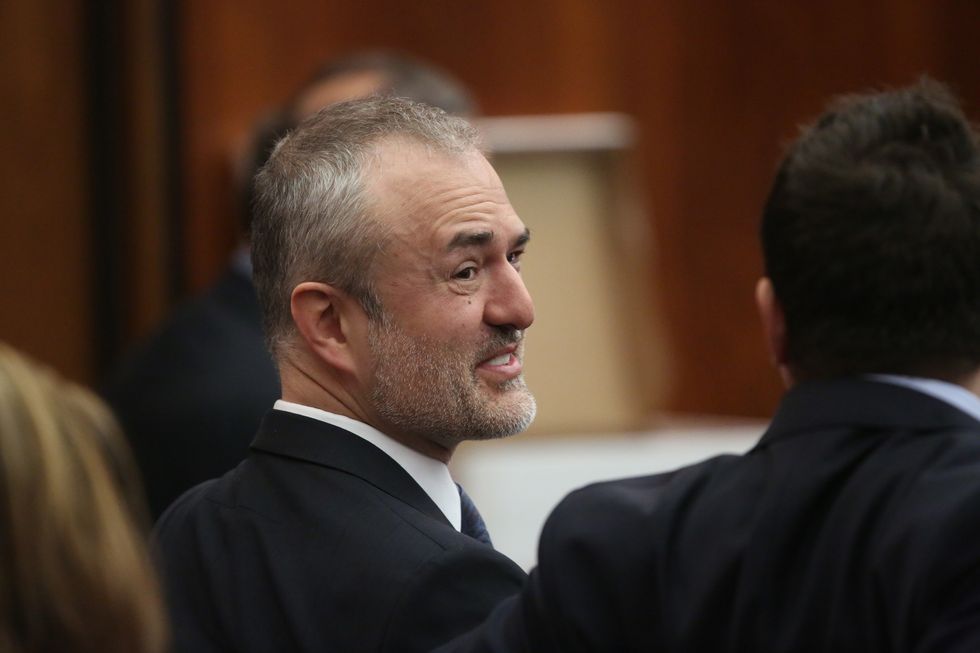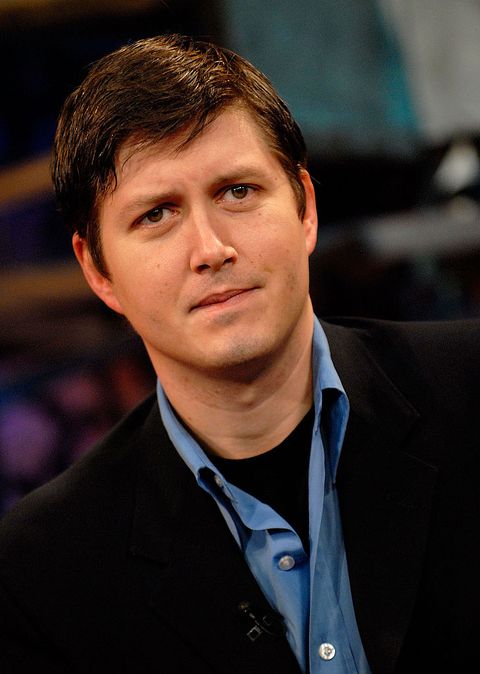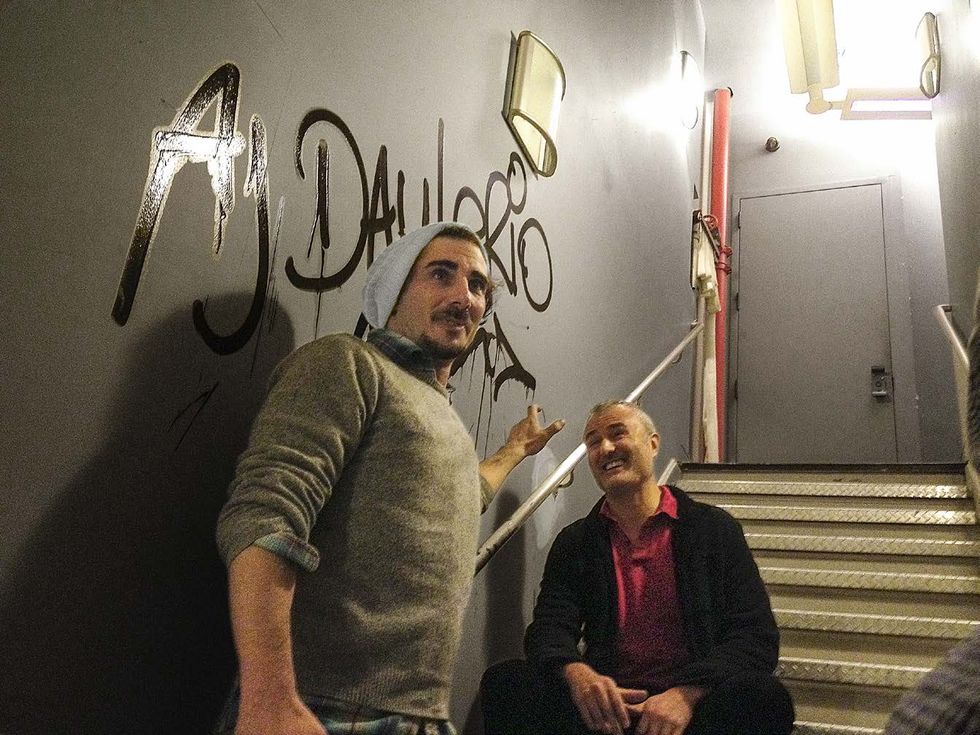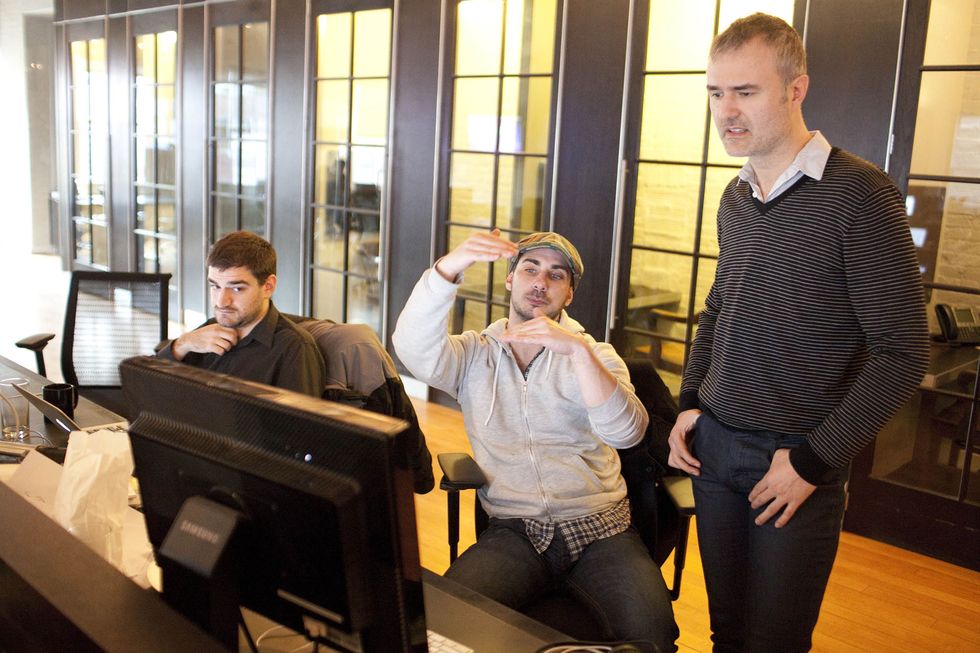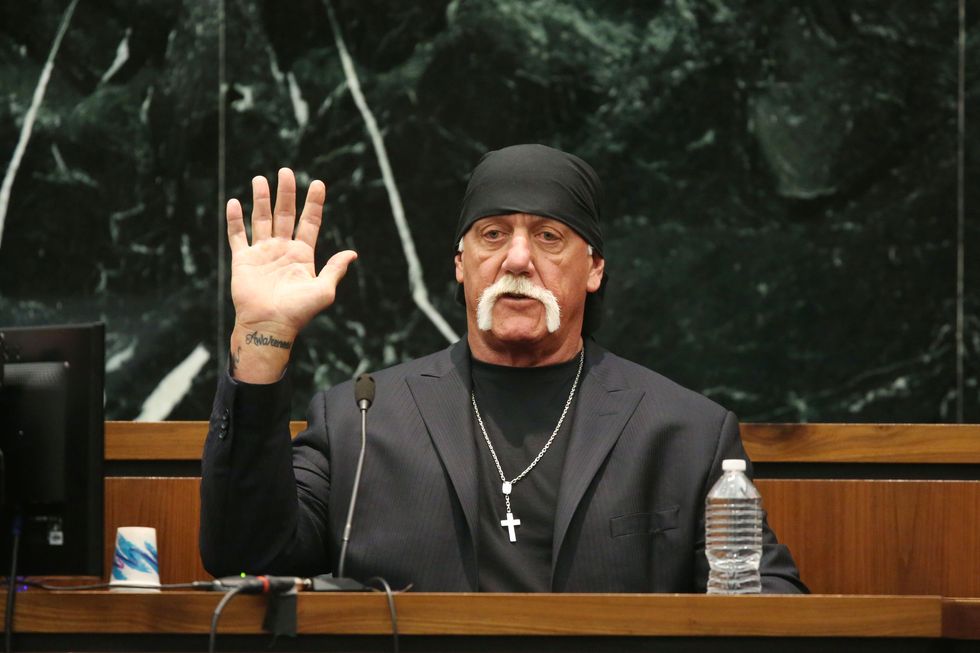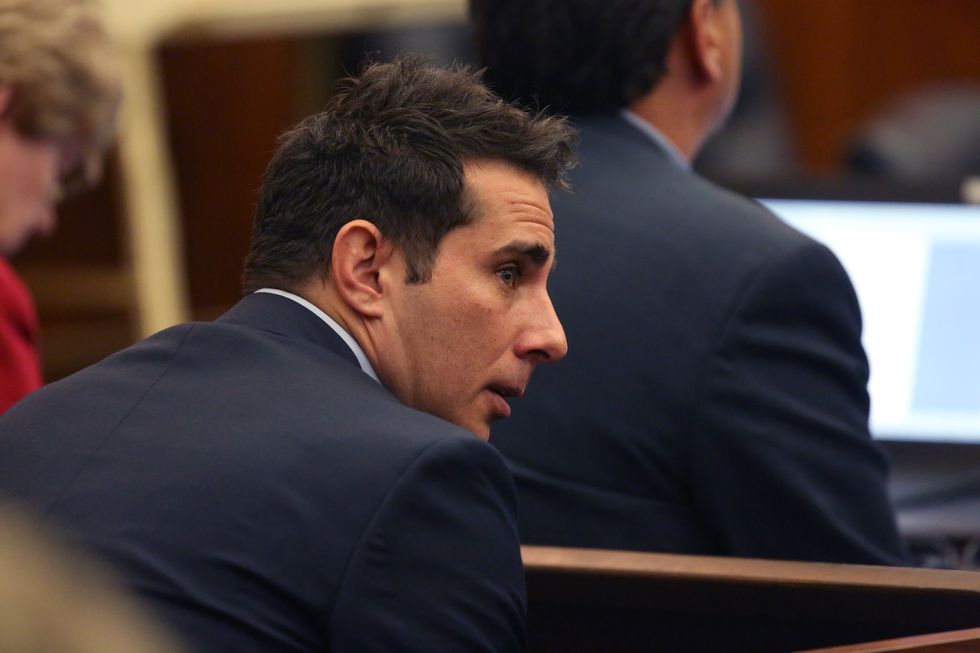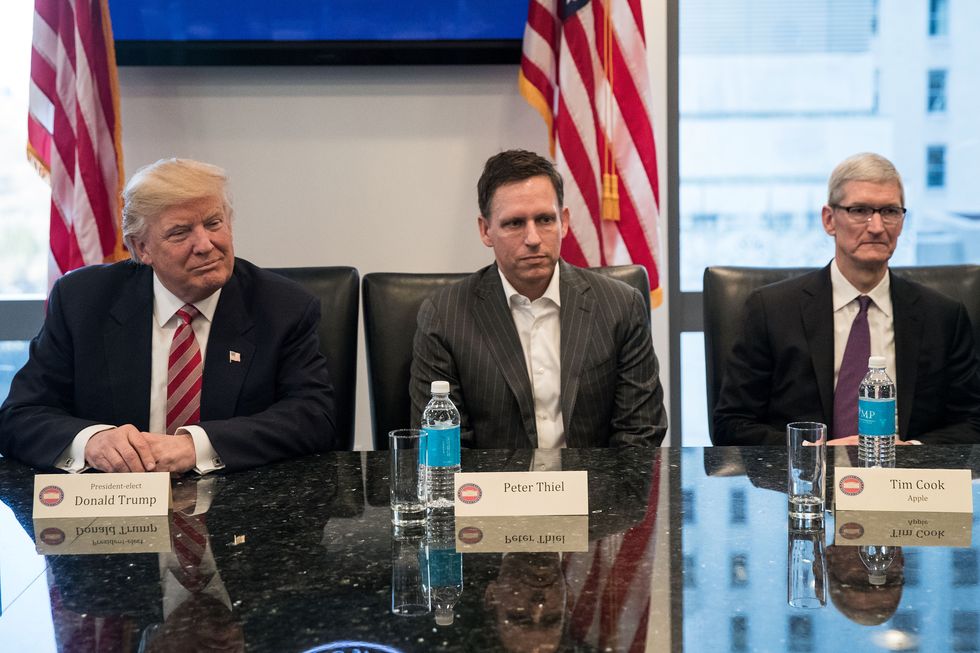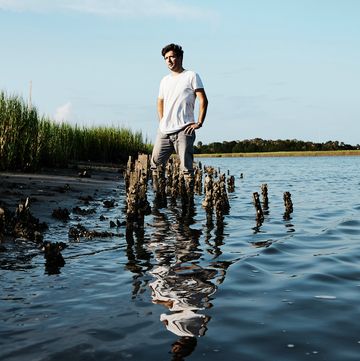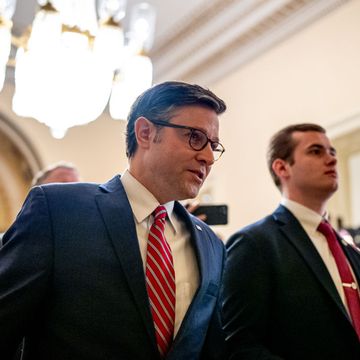"I've been thinking a lot about a photo of me from the trial that ran in The New York Times," A. J. Daulerio tells me one Sunday this past September. We are on the concrete porch of an apartment he's renting in a dismal section of Singer Island, Florida. He's wearing a T-shirt, baggy basketball shorts, sweat socks to midcalf, and shower shoes—a look he describes as "homeless chic." He rolls a cigarette and a lighter around in his palm like they're Chinese therapy balls.
Not all that long ago, as the editor in chief of Gawker.com, Daulerio was among the most influential and feared figures in media. Now the forty-two-year-old is unemployed, his bank has frozen his life savings of $1,500, and a $1,200-per-month one-bedroom is all he can afford. He's renting here, he says, to be near the counselors and support network he has come to rely on lately.
Six months earlier, Daulerio was in a Florida courtroom two hundred miles away, a defendant in a high-profile invasion-of-privacy lawsuit filed by former professional wrestler Hulk Hogan and secretly funded by Peter Thiel, the billionaire venture capitalist and Donald Trump supporter. Hogan, whose real name is Terry Bollea, had sued Daulerio; Daulerio's former employer, Gawker Media; and Nick Denton, Daulerio's former boss and the founding CEO of Gawker Media, for more than $100 million.
The suit stemmed from a 101-second video Daulerio posted on Gawker.com that showed Hogan having sex with Heather Clem, then the wife of Florida radio personality Bubba the Love Sponge. Throughout the two-week trial, there were many strange moments. Like when Clem testified that her husband had encouraged her to have sex with his friend Hogan. Or when Denton read aloud the column Daulerio had posted with the video. (The post, which was viewed more than five million times, was titled "Even for a Minute, Watching Hulk Hogan Have Sex in a Canopy Bed Is Not Safe for Work but Watch It Anyway.") Or when Hogan, who rose to fame during the 1980s in World Wrestling Entertainment, took the stand to explain how Hogan (the character) and Bollea (the man) had different penises.
This bizarre distinction was germane to the potentially far-reaching First Amendment issues at stake. Gawker's lawyers claimed the video was newsworthy, and protected by the First Amendment, because Hogan was a public figure who had written about and discussed his sex life publicly, once describing his penis as "the Loch Ness Monster." The crux of Hogan's case, meanwhile, was that the man in the video was not the public figure Hogan but the private citizen Bollea, whose privacy Gawker had invaded.
The moment that perhaps most stunned the jury, however, belonged to Daulerio. Hogan's lawyers played video of a deposition in which an attorney asks Daulerio, "Can you imagine a situation where a celebrity sex tape would not be newsworthy?"
"If they were a child," Daulerio says.
"Under what age?" the attorney asks.
"Four," Daulerio says.
As The New York Times reported, "A palpable sense of shock rippled through a courtroom here."
Daulerio spit out that response, he says, as a weary "fuck-off" to the lawyer who had subjected him to a nine-hour deposition. Yet as he watched the jury's reaction, Daulerio became convinced that Gawker Media and his career were over. He anticipated countless people whom he had eviscerated—as the top editor of Gawker Media's sports site, Deadspin, and then at Gawker.com—would be overjoyed, viewing the company's ruin and his own professional demise as their comeuppance. On the former count, at least, he was right. The jury not only awarded Hogan $115 million in compensatory damages, it also tacked on $15 million in punitive damages against Gawker Media, $10 million against Denton, and $100,000 against Daulerio.
In the Times photo Daulerio tells me about, he is seated on a courtroom bench, looking over his shoulder. "I'm staring into a corner of the ceiling," Daulerio says as he lights his cigarette. "I was just trying to refocus on everything that was happening in the courtroom, which was horrible, but it was still ten times better than anything going on in my head at that point."
What was going on in his head was his struggle to stay sober—and his struggle to understand a memory of being molested as a boy.
On the Sunday Daulerio and I meet, we join his parents at a sports bar to watch their hometown team, the Philadelphia Eagles, play the Cleveland Browns. Mr. Daulerio is tall, with eyeglasses, a mustache, and a kind face. Mrs. Daulerio is in a wheelchair, wrapped in a windbreaker. In no time, Daulerio's dad is talking like a proud father. "A. J. was writing even as a kid. When he was in fifth grade, he wrote stories. . . ." Daulerio lovingly rolls his eyes, as if to say, "Here we go."
The A. J. stands for Albert James. He was raised in Churchville, Pennsylvania, a working-class suburb of Philadelphia. His father, Al, worked as a manager for the Ford Motor Company. His mom, Pat, was a secretary. The couple recently moved to Florida because Al thought a change of scenery would be good for Pat, who had fought ovarian cancer. Plus, Al says, some friends have stopped talking to them since the trial.
As a child, Daulerio had trouble sleeping and would bang on his parents' bedroom door each night. "I don't know if he felt lonely or scared," Al says. "But it was bad." His parents took him to a therapist, who advised them to lock their bedroom door to keep A. J. out—tough love to help the kid get over what was thought to be a phase. After a few sessions with the therapist, Daulerio begged his parents not to make him go any longer; they ended the treatment.
Daulerio's insomnia was no phase. It was part of what enabled him to become his best and worst self. After graduating from La Salle University in 1996, he landed a reporting gig at a suburban Philly newspaper. During the three years he covered pie-eating contests and zoning-board hearings, he discovered that getting scoops gave him a rush. The more writing he did, the more scoops he got, and the more he was hooked. In 1999, he quit and, without a job lined up, moved to the place where he thought real writers go: New York.
I first called Daulerio last July to see if he would participate in a profile. It was during our initial meeting, which was off the record, that he revealed he was trying to kick a drug and booze addiction and was confronting a recovered memory.
Daulerio said he would cooperate if I would omit the rehab and the memory. I said I didn't think it was right to tell his story without those facts. In the days that followed, he agreed to talk on the record about everything.
Between this past summer and November, we had many long conversations in which it seemed like he was thinking out loud, dealing—and in many ways not dealing—with a cat's cradle of issues. During one conversation, he said, "If you woke up tomorrow and you owed Hulk Hogan $115 million dollars—just imagine that. Say it out loud a couple of times. No person can conceptualize how I would get into that situation."
Maybe. But Daulerio didn't simply wake up one day in that "situation." If you consider the choices he's made throughout his career, it's not only easy to see how he ended up on trial; in some ways it seems inevitable.
Once Daulerio got to New York, he took whatever reporting jobs he could get: a year at Law.com, and then three years at The Bond Buyer. "I was willing to write about boring shit," Daulerio says. He spent his sleepless nights hanging with aspiring-writer friends, including Will Leitch and Daulerio's roommate, Eric Gillin, cooking up a website.
"There was a lot of weed and a lot of drinking," Leitch says. "Frankly, we were a bunch of losers and could party like that because we didn't have anything to lose." In January 2003, they launched BlackTable.com.
It was a boom time for digital media. Sites like Digg, Dooce, and The Huffington Post were just a few of the biggies to launch in the early 2000s. In late 2002, Nick Denton's Gawker.com entered the mix. A former journalist for the UK's Financial Times, Denton wanted Gawker to do the stories journalists gossiped about but never wrote, either because they didn't want to burn a source or because the subject matter was too risqué for traditional print.
The vision Daulerio and company had for Black Table was similar to Denton's. Some of BT's best ideas emerged when they were stoned, Leitch says. New York had just debuted 311, its city-services information line. "We got the idea," Leitch says, "to call and ask questions like 'Can you tell me how to get a license to shoot a porn?' "
By early 2005, Gawker Media was thriving and had launched the spin-offs Wonkette, Jalopnik, and Lifehacker. Leitch approached Gawker with an idea for a sports site. Lockhart Steele, Gawker's managing editor, told Leitch they weren't interested but were looking for someone to edit a gambling site. Leitch hated gambling; he recommended Daulerio. Daulerio didn't know a thing about betting, but he bluffed Steele into hiring him. The site, Oddjack, folded within six months.
In the meantime, Leitch had persuaded Denton to do the sports site. "Independent sports blogs are everywhere," he wrote in a memo, "but they don't have any passion." Deadspin premiered in September 2005, with Daulerio as an occasional contributor. The pay was nothing, so he took a job with Philadelphia magazine's website. Daulerio quickly tired of the magazine's owners bitching about what he wrote on the blog and the print writers' condescension. "It all felt so self-important and wrong," he says.
Leitch rescued Daulerio in March 2008, hiring him at Deadspin as a writer. That year, the Financial Times reported Deadspin was the world's most-visited sports blog, with 116 million visitors. Still, Denton pushed for more traffic. Leitch didn't like having to manage a site fixated on web metrics, so he quit to write for New York magazine. In a farewell column, Leitch introduced Daulerio as the new EIC, writing, "We can't wait to see where he takes this place."
Leitch's Deadspin had a hair-tussling playfulness, but Daulerio had a different vision. "He wanted to get to the seedy underbelly of shit," Steele says. In addition to snarky commentary on the news of the day, Daulerio demanded well-written original pieces. "I didn't want to just follow the news," he says. "I wanted Deadspin to break news."
He pegged Tommy Craggs as the reporter for the job. Craggs had been freelancing for the site while fact-checking for ESPN's magazine. The two met at the Chinese restaurant near Gawker Media's Manhattan offices; the place had a bar few people besides Daulerio ever frequented. He dubbed the joint Chinese Fantastico. It became his office.
Over drinks, Daulerio convinced Craggs to take the job. "I liked his fearlessness," Craggs says. At Deadspin, Craggs wrote stories like the one about the Vancouver scorekeeper juicing stats to earn media coverage for the Grizzlies. He scored an advance copy of a tell-all book written by a former NBA ref about alleged gambling corruption in the league. By traditional journalism standards, these were solid stories, scoops of dogged reporting.
Yet these pieces were not what pulled traffic—and Daulerio was all about the traffic. He once told a Deadspin staffer, "If less than three thousand people click on what you write, you fucked up. You might have fucked up the title. You might have fucked up the picture. You might have picked a story that no one cares about, but you fucked up."
During Daulerio's first few months, the posts that drove traffic included one about a Washington Redskin who'd mistakenly blogged a photo showing his penis, a pic of a New England Patriots cheerleader drawing a penis on a passed-out partygoer, and a screen grab of a TV news broadcast in the Minnesota Vikings' locker room that had inadvertently revealed a player's penis. In short, Daulerio's Deadspin was all about dongs. And disgrace.
In the spring of 2009, he was given a tip about Texas Rangers star Josh Hamilton, who had recently gotten sober. Daulerio posted photos of Hamilton partying in a bar in Tempe, Arizona. "The Devil Is Still in Josh Hamilton" drew two million hits, making it one of the most-viewed pieces in Deadspin history.
Before Daulerio posted it, he called Leitch. "We strategized about how can we make the point and keep the journalists with the capital J happy? A. J. even had the Rangers take a look at the photos to confirm it was Josh before posting. It was a solid story."
Daulerio's Erin Andrews story, Leitch says, was another matter. In July 2009, Daulerio linked to a now-notorious video of the ESPN reporter undressing in a hotel room; it was footage some perv had filmed through the keyhole of her room. "There was no reason to do that story," Leitch says. "It's gross and nasty. A. J. was like, 'Why does that have anything to do with it?' " Leitch tells me that was "the kind of thinking that fundamentally led to the Hogan thing."
The following year, a New York Jets sideline reporter, Jenn Sterger, told Daulerio off the record that Brett Favre had been texting her pictures of his penis. As the story broke, Daulerio learned Favre had sent lewd texts to two other women. He paid a source $12,000 for pictures that Favre had allegedly texted to Sterger. Describing how he got Denton to give him the money, he told a reporter that he'd said, "I'd like to reach into the sack of scuzz money and pay for pictures of Brett Favre's dick, please."
After failing to get Sterger to go on the record, Daulerio decided to break the Favre scandal with the dick pics and voicemails, and use Sterger's off-the-record information—a clear breach of journalistic ethics. "A. J. posted that story while I was out of the office," Craggs says. "He knew I would have objected. The Favre story was a good story. I just think we could have gotten it without torching the source."
Journalists may have debated Daulerio's decision to use off-the-record material, but there was no denying that if true, a married future NFL Hall of Famer sexually harassing women was a legitimate story. Deadspin was becoming a must-read. "Hamilton, Favre—these were stories that sent shock waves," Fox Sports commentator Joe Buck says. "As much as I want to question or roll my eyes at stuff that was in there, they also have value and proved their worth many times over. Daulerio was a force to be reckoned with."
The Favre story pushed Deadspin and Daulerio into the spotlight—giving Daulerio reason to celebrate. He had never hidden his vices. Daulerio had talked about drugging and boozing in interviews. Now, however, he made his addiction the centerpiece of a story—his story. In the summer of 2011, he dropped acid and tried to pitch a no-hitter on Xbox baseball. Naturally, he posted a video of the stunt. The same year, he went to MetLife Stadium to visit his new friend Buck, who was calling a Packers–Giants game with Troy Aikman. In the booth, Daulerio ducked into the bathroom with an eight ball of coke.
"When I went to open the bag, I Woody Allened it; the coke went everywhere," Daulerio says. "I didn't want anyone to think Joe or Troy was doing blow, so I cleaned it up by snorting as much as I could. There had to be coke all over my beard and jacket. Joe asked if I wanted to meet Troy, and I was like, 'No thanks.' And I got out of there."
More and more, Daulerio came into the Deadspin office later and later—that is, if he came in at all. "He would disappear," Craggs says. "There were times when we really needed a decision and he wasn't around."
But Daulerio was around enough to ensure that Deadspin drew monster traffic. When he took over the site in July 2008, it had 700,000 readers per month. By late 2011, it had 2.6 million. Even Denton, who was no sports fan, was impressed. "A. J.'s breaking stories that keep ending up on the front page of the New York Post," Steele says. "Nick was like, 'What's going on over there at Deadspin?' At that point, A. J. and Nick formed their bond."
Daulerio started to get job offers; Denton asked his star EIC what he could do to keep him. Daulerio said he wanted Gawker.com, Denton's flagship. In November 2011, Denton said goodbye to editor in chief Remy Stern and installed Daulerio.
When Daulerio took over Gawker.com, staff morale was abysmal—Stern had not been popular—and Denton's desire for web traffic had not abated. "For the first month I was there, I basically didn't do anything," Daulerio says. "I watched how the place ran." But then he made his moves.
He poached Neetzan Zimmerman from the little-known site TheDailyWhat. In Zimmerman, Daulerio saw signs of brilliance at aggregating pop-cult potpourri primed for viral sharing. Almost immediately, Zimmerman's efforts attracted more than thirty million page views per month to Gawker.com, seven million over the monthly average. This liberated the rest of the editorial staff, including John Cook, from having to worry about traffic. "A. J.'s view," says Cook, "was you just buy enough space with traffic success to let your writers devote time and energy to the stories that they want to do."
Daulerio made two other personnel changes. During his month of observation, he noticed that twenty-four-year-old Leah Beckmann, then the assistant to the editor, held the staff together; he promoted her. He also lured Emma Carmichael away from Deadspin and made her managing editor. As Daulerio puts it, "When Emma's around, everyone works harder and better."
These moves allowed the staff to gel and traffic to soar, but they also enabled Daulerio to unravel. His former colleagues give the impression that they were too indebted to him to say anything about his behavior, so they went along for the ride. Cook recalls a hazy, boozy midday outing to Belmont Park. Beckmann had many nights out with her boss that didn't end until 4:00 a.m. One time, at a sex-toy party, she says, "A. J. was like, 'Do you want to eat acid?' And so we ate acid." And then in the late fall of 2012, Daulerio began a volatile five-month relationship with Cat Marnell, who wrote about her life as a drug-addled New York party girl in a Vice column. She was a kindred nightcrawler spirit. "We started our dates at 5:00 a.m. and wrapped at 10:00 a.m.," he says, "and then I went to work."
Because Daulerio was "often completely MIA," Carmichael says—sometimes for days—she was essentially the EIC of Gawker. When the envelope with the Hogan DVD showed up at the Gawker.com offices that October, Daulerio was on vacation.
It all started with an email to Daulerio from someone who admired Deadspin. A few days later, a thirty-minute video of Hogan having sex with Heather Clem arrived. From the road, Daulerio told Carmichael to have a look. "Thanks for making me watch that," she texted him.
When he returned to the office, Daulerio directed an editor to cut the video down to one minute and forty-one seconds, with approximately nine seconds of sex footage. Then he got clearance from Gawker's attorneys. "I felt we had to show some sex to confirm the rumors," Daulerio says. "There really is a Hulk Hogan sex video." He decided it was newsworthy because it was the latest in a string of celebrity sex videos the public couldn't seem to get enough of. In a blog post embedded with links to the Tommy Lee–Pamela Anderson and Kim Kardashian sex videos, he wrote:
"Because the Internet has made it easier for all of us to be shameless voyeurs and deviants, we love to watch famous people have sex. . . . We come away satisfied that when famous people have sex, it's closer to the sex we as civilians have from time to time. . . . Up top, you'll see . . . footage taken of 59-year-old Hulk Hogan, professional wrestler, Real Life American Hero to many, fucking a woman rumored to be the ex-wife of his best friend, a famous radio DJ named Bubba the Love Sponge. This footage was stealthily circulated last April. TMZ reported its existence, The Dirty showed some screen shots, and Hulk lawyered up because he claims he was 'secretly filmed.' Last week, a burned DVD copy of Hulk having sex with the woman rumored to be Heather Clem (Bubba's ex-wife) was delivered to us through an anonymous source. They wanted no payment. They wanted no credit."
Within days, Hogan's attorneys insisted Gawker remove the video. Gawker refused. In October 2012, Hogan filed his lawsuit. Three months later, Daulerio left Gawker. To hear him and many staffers tell it, his departure had nothing to do with the lawsuit; in fact, no one at the site took the suit seriously at first. Daulerio says he simply figured he should leave the company while his market value was at its peak.
Denton hosted a farewell bender at his SoHo apartment. "Nick really loved him," Cook says. "I think Nick saw in A. J. a glibness and sociability and coolness that Nick lacks." During the party, as a goodbye prank, Daulerio had a graffiti artist tag "A. J. Daulerio" on a wall of the private stairwell leading to Denton's loft. Denton found the vandalism so amusing, he posed with Daulerio in front of the tag and said he would just pay to have it removed.
Daulerio maintained a consulting contract with Gawker and signed on as director of editorial for SpinMedia. The contracts put him on track to earn $475,000 annually. Within three months, however, new leadership at Spin terminated his lucrative deal. It was both the best and the worst thing for Daulerio, as it left him with six months of severance. "I had a cigar box that was basically a pharmacy," he says. "It was like my rainy-day box, and it was always raining." In September 2013, Hogan's attorneys deposed Daulerio. He is certain he was not high at the time but can't say for sure whether he was hungover.
Using some of his severance as seed money, he conceived a website of his own, Ratter.com, which he envisioned as a regional version of Gawker. In the midst of getting Ratter off the ground, Daulerio woke up one morning and looked at his coffee table. Bong, booze bottles, cocaine. He thought, I'm taking one drug to get high, another drug to go sideways, another to go up again, and another to go sideways again.
He called his friend Maer Roshan to help him, and in August 2015 Daulerio went to a detox facility in New Jersey. Ten days later, he returned to New York and got wasted. Daulerio was back on the coke and the pills, and he was scared: "There were a lot of nights where I would lie there and ask myself, 'Did I cross the line this time? Is this the moment where everything shuts down on me?' "
In October, Daulerio arranged to go to Harp Rehab in West Palm Beach, near Singer Island. The day he was scheduled to fly to Florida, he got cold feet, so he called his pal Lockhart Steele, now the editorial director of Vox Media. Steele invited him to his apartment, where they watched baseball. The next morning, Steele walked with Daulerio into JetBlue's terminal at JFK. "I'm not going to push you through security," Steele told him. "You need to make that choice for yourself." The next time he heard from Daulerio was a couple weeks later. "He said it was hard but he was glad he was there."
Harp Rehab is a holistic program, and it was during an acupuncture treatment, feeling the specialist's hands on him, that Daulerio started to remember the therapy he'd had as a nine-year-old boy. He recalled being in a darkened room while the therapist took off his shirt and put his hands on him. He couldn't remember what had happened next, but, he says, "I felt I knew something terrible had happened."
After forty-five days at Harp, Daulerio left to visit his parents in Florida. He told them about the memory. His mother said that after they discontinued the therapy, they took Daulerio to see his physician, who told her he believed Daulerio might have been molested. (When I contacted the doctor, he said he had no memory of discussing molestation with the family.)
Daulerio was furious. "Why didn't anyone tell me this?" he shouted. "Why didn't you do anything about it?"
The room was quiet, tense. Al Daulerio told his son that until that moment he never knew the doctor had suggested Daulerio might have been molested.
"It was classic sweep-everything-under-the-rug," Daulerio says.
The next morning, he and his father continued the conversation and ended up yelling at each other. Al insisted they had taken him to the therapist when he was younger than nine. Daulerio was adamant his timing was correct, though in light of what his mother had said, his age at the time wasn't the most important detail. Further frustrating him was the fact that his parents could not remember the therapist's name.
Al tried to calm his son. "I don't want to upset your mother," he said. It wasn't what Daulerio wanted to hear.
Al asked him, "Do you want to hit me?"
Again: "Do you want to hit me?"
Daulerio knocked his dad to the ground and left the room.
"He had never done anything like that before," Al tells me. "Later, he told me it was an accident. He thought I'd stepped toward him."
While Daulerio and I are on his front porch that Sunday in September, he gets a text from Denton. "He's asking how I'm doing," Daulerio says. "I haven't heard from him in weeks."
In therapy, Daulerio began to write down things that made him angry and then toss the paper in the trash. Seeing Denton's text, Daulerio says, "I can't tell you how many times I've written 'Nick Denton' on a piece of paper and crumpled it up and thrown it away."
The tension began in the summer of 2015, nine months before the trial, when Denton contracted a public-relations firm to tell Gawker's side of the story. Daulerio emailed Denton: "You've got enough talented people on staff who know . . . why I believe I had the right to publish it, and why they should want to preserve the right to publish stories like that in the future. The only person I've had any lack of confidence in has been you."
That summer, the National Enquirer obtained a transcript of another Hogan video, most of which was a conversation between Hogan and Clem. The transcript, which had been under seal in the Florida court, revealed that Hogan had referred to African-Americans as "niggers" several times. World Wrestling Entertainment severed all ties with Hogan. The story would soon cause Daulerio problems he could not foresee.
His relationship with Denton further eroded during the preparations for trial. Daulerio felt Denton and the Gawker lawyers were cutting him out. "The first time I really got any witness preparation," Daulerio says, "was when I arrived in Florida for the trial." After the jury viewed Daulerio's deposition, Daulerio and Denton went for a walk outside the courthouse. Daulerio told Denton about the unlocked memory and suggested it might be worth discussing on the stand to counter the implication that he would actually post a sex video of a child. Daulerio noted that Denton didn't express concern for him; the gist of his response was that he didn't see how sharing that information would help Gawker. "That's Nick," Daulerio says.
What little was left of their relationship was shredded in the verdict's aftermath. The Florida court didn't care which of the three defendants—Daulerio, Denton, or Gawker Media—paid the $115 million in compensatory damages. But none of them had that kind of money. This past summer, months after the verdict, while Gawker's attorneys worked on an appeal, Denton and Gawker Media each filed for bankruptcy. All of their debts to Hogan—$140 million—transferred to a New York bankruptcy court, thus protecting their assets from the former wrestler. Hogan was forced to get in line with all of Denton's and Gawker Media's outstanding creditors, and to negotiate a settlement with the Gawker estate.
In August, Denton sold Gawker Media to Univision for $135 million. Univision acquired Deadspin, Gawker.com, Lifehacker, Gizmodo, Kotaku, Jalopnik, and Jezebel. In November, Gawker agreed to pay Hogan a $31 million settlement, and dropped its appeal. (As of press time, it appeared imminent that a bankruptcy judge would approve the deal.) "Nick told me part of the reason he was settling was he didn't want to be the cause of me overdosing," Daulerio says. "I mean, if that's the way he felt, if he really cared about me, why didn't he reach out to me and try to get me help while I worked for him?"
Gawker's bankruptcy, however, had excluded Daulerio—and left him on the hook for $115.1 million. Hogan's attorneys pursued Daulerio's "assets" as if they were going after the full nut, deposing him over his finances and persuading the bank to freeze his account.
It was a brutal, strategic move, and Daulerio felt it was legal extortion. "They were leaning on me to give them information about the transcript that got leaked to the National Enquirer," Daulerio says. "I have no idea how that transcript got out."
A Cleveland-based attorney, David Marburger, outraged by what he saw as legal harassment, called Daulerio and offered to represent him. Though he won't disclose specifics of his settlement proposal, which in large part depends on Gawker's deal being approved, Marburger says he's trying to strike a deal that would resolve Daulerio's damages.
But these days, Daulerio isn't sure of anything. If Hogan insists on owning the copyright to anything related to the trial, Daulerio says he would reject the deal. (Such a prohibition could keep Daulerio from, say, writing a memoir that addresses the case.) Also, Daulerio doesn't want to give up his right to appeal or to pursue legal action against Peter Thiel, the billionaire who funded Hogan's lawsuit. According to what the judge in the case said in court statements, the plaintiff and the defense each spent approximately $10 million. Almost a decade earlier, a Gawker site called Valleywag had outed Thiel, one of PayPal's cofounders. In the Hogan case, he saw a chance to pursue his vendetta against Gawker Media.
Within days of acquiring Gawker Media, Univision shuttered Gawker.com, claiming the brand was too damaged. In October, speaking at the National Press Club, Thiel addressed his role in Gawker's demise, saying he was proud to have supported the Hogan action and was pleased with the outcome. He referred to Daulerio as an "aspiring child pornographer."
The Gawker verdict left many legal pundits scratching their heads, especially since a federal court had ruled not long before the state trial began that the video was protected and newsworthy, as it was part of an ongoing conversation in the media. As he talked with Marburger, Daulerio found the idea of filing his own appeal of the Florida verdict, and possibly suing Thiel, especially intriguing in light of the presidential election.
At a campaign rally last February, Trump said, "If I win . . . I'm going to open up our libel laws so when they write purposely negative and horrible and false articles, we can sue them and win lots of money." Donald Trump's wife, Melania, recently filed a defamation lawsuit against a Maryland blogger and the UK tabloid the Daily Mail for reporting that she once worked as an escort. Her attorney is Charles Harder—the same lawyer Thiel paid to represent Hogan.
"Thiel now has a playbook to obliterate the media," Daulerio says. "We have Trump in office, and this person who is very close to him has this playbook." When I ask him if Thiel was right to call Gawker "sociopathic," Daulerio goes off on a long rant. "Maybe you need that sociopathic bully to fight back against a sociopathic bully. And the thing is, Nick is out. I'm not out."
While in rehab, Daulerio began to write down the names of the people he thinks he should make amends with. "The list is pretty long," Daulerio tells me one night over the phone. As he talks through that long list, however, thinking aloud about the pieces he did at Deadspin and Gawker, recalling the people he wrote about and the stories he revealed—as well as their impact, both real and moral—he seems to find a just cause for every one of his decisions.
"I mean, where was I doing my job and where was I doing something I need to apologize for?" he says.
For a few long seconds, a hollow silence lingers between us.
The only post Daulerio appears to regret is the one about Josh Hamilton's struggle to stay sober. "That's one I would still do," he says. "But I would do it differently. I would have more empathy. I have a different perspective on that one because I know how challenging it is."
He tells me how fragile a person is during the first year of sobriety; he tells me, as he has told me many times, how fragile he is. He says that he "could be Josh Hamilton in a second." Or worse.
He pauses. It's getting late. We're both tired. At least I am. I want to get off the phone, but Daulerio, he doesn't want to go to sleep. He wants to keep talking. He wants to keep making his case.
This article appears in the February '17 issue of Esquire.
